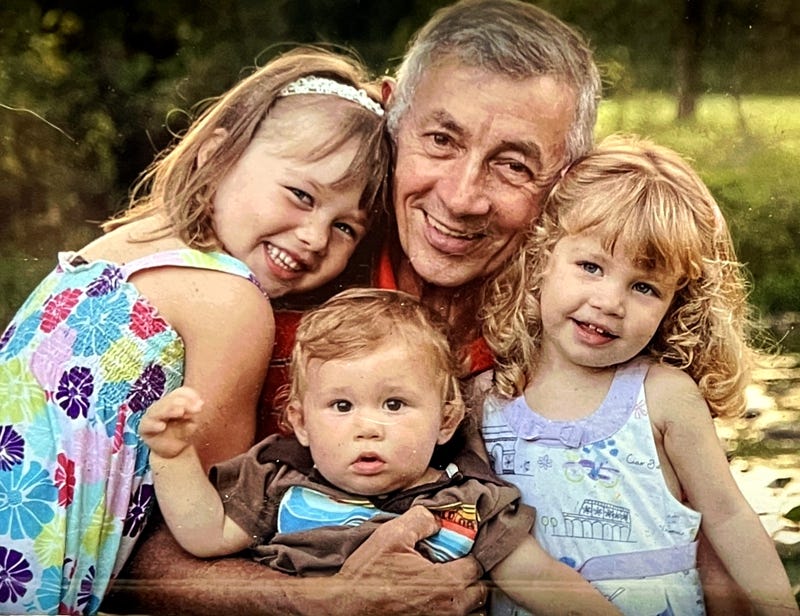Part 1: Almost Born in the Cab of a Truck
Throughout his working life, if he wasn't operating a crane (he completed that five-year apprenticeship in 1975), Peter was trucking. In mild weather, it wasn't unusual for him to bring along one of his four young children. "Oh, yeah, I took them to the States. Some places you weren't allowed passengers when you'd be loading up. I'd hide them in the bunk, pull the curtain."
He recalls one trip, with his infant son, "I was up in Chatham, picking up a load. And these two young women came out one of the doors for a smoke. I've got him on my driver's seat of my Kenworth. Open door, it's summertime. I'm standing there on the step, holding his legs up, wiping him down, putting on the diaper. The girls come walking over. They said, 'Are you doing what we think you're doing?'"
Driving back from Northern Quebec in a day cab (no bunk) on another occasion, he was dog tired, in need of a rest, yet still miles away from the motel at which he normally stopped.
"I found a place to park, and I shut her down. Then little Shawn, he starts crying, 'I want my mommy! I want mommy!' I said 'Shawn, if daddy doesn't have a little sleep, we're both going to die.' He was crying and crying. When I woke up, he was sleeping. I never had to stop at the motel, I drove right through, right back to Kitchener."
He vividly remembers delivering a load of oil to Manitoulin Island at four in the morning. His three-year-old was with him that time, and she'd been ill. "The only one I didn't take on the road with me was my youngest daughter," he says. "And I feel bad, because she used to cry when I'd leave." Due to the short bunk in his Kenworth, to this day Peter says he still sleeps with his knees bent.
In his late twenties and early thirties, he was a sky diving enthusiast and instructor with more than 500 jumps under his belt. He often served as jump master - the person responsible for the safety of the three paying customers awaiting their turn. After double-checking everyone's equipment, after gauging the wind direction and speed, he'd usher them out of the plane one at a time and then jump himself.
A close friend and others he's known have died in sky diving accidents. It is, he says, a single person's sport that he gave up around the time he married. He didn't want to fear for his new wife's safety, and agreed it wasn't fair to cause her similar anxiety.
Trucker. Crane operator. Sky diver. Family man. Growing up in the aftermath of World War II, Peter says, "I've read a lot of war history, a lot of stories. I know how much people sacrificed, young people." He attributes his keen sense of honour and social obligation to that body of literature.
Amid everything else that was going on in his life, year after year, decade after decade, Peter contributed to the well-being of the wider community measurably and tangibly. From 1967 onward, he was a dedicated blood donor. Back then, people could only donate whole blood four times a year. Later, the Red Cross began accepting plasma donations every three weeks. Peter can tell you when a blood bank in his region extended its hours until 7 pm and when another began staying open late on Tuesdays and Wednesdays. Whatever he happened to be doing, he tried his best to wrap up his workday early enough to get there.
"There were times I knew I was gonna be out-of-town for a week, and I wasn't supposed to donate until the next day," he says. "Two or three times I tried to sneak in, but they caught me each time. A wasted trip."
After every hundred donations "we'd be called in. I'd get a plaque and it would be a night out for me and my wife. I was still doing the whole blood for my first hundred in London. And then I got another one for two hundred. Then three hundred, four hundred, five, six. When the pandemic hit and they shut down, I was at 798."
next installment: Not Another Drop





